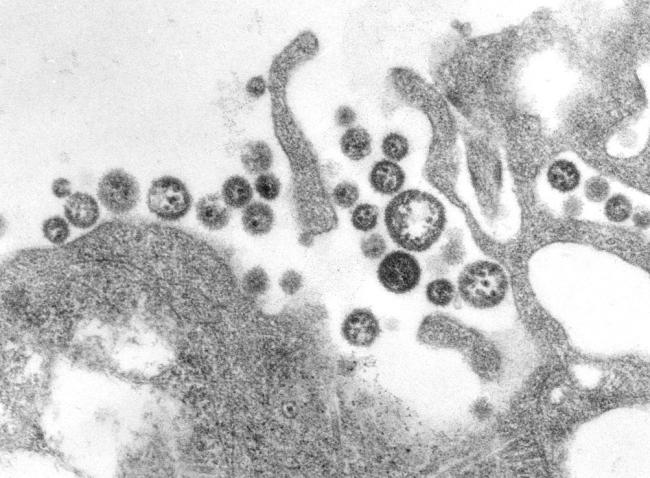Scientists develop novel vaccine for Lassa fever and rabies
Media Advisory Thursday, October 11, 2018
Scientists develop novel vaccine for Lassa fever and rabies

What
A novel vaccine designed to protect people from both Lassa fever and rabies showed promise in preclinical testing, according to new research published in Nature Communications. The investigational vaccine, called LASSARAB, was developed and tested by scientists at Thomas Jefferson University in Philadelphia; the University of Minho in Braga, Portugal; the University of California, San Diego; and the National Institute of Allergy and Infectious Diseases (NIAID), part of the National Institutes of Health.
The inactivated recombinant vaccine candidate uses a weakened rabies virus vector, or carrier. The research team inserted genetic material from Lassa virus into the rabies virus vector so the vaccine expresses surface proteins from both the Lassa virus and the rabies virus. These surface proteins prompt an immune response against both Lassa and rabies viruses. The recombinant vaccine was then inactivated to “kill” the live rabies virus used to make the carrier.
There are currently no approved Lassa fever vaccines. Although Lassa fever is often a mild illness, some people experience serious symptoms, such as hemorrhage (severe bleeding) and shock. The overall Lassa virus infection case-fatality rate is about 1 percent, according to the World Health Organization (WHO), but that rate rises to 15 percent for patients hospitalized with severe cases of Lassa fever. People contract Lassa virus through contact with infected Mastomys rats and through exposure to an infected person’s bodily fluids. Lassa fever is endemic to West Africa where these rats are common. In 2018, Nigeria experienced its largest-ever Lassa fever outbreak, with 514 confirmed cases and 134 deaths from Jan. 1 through Sept. 30, according to the Nigeria Centre for Disease Control.
Africa is also at high risk for human rabies. The WHO estimates that 95 percent of the estimated 59,000 human rabies deaths per year occur in Africa and Asia. Nearly all human rabies deaths are caused by bites or scratches from infected dogs. Effective rabies vaccines and post-exposure shots are available, but many deaths still occur in resource-limited countries, according to the Centers for Disease Control and Prevention.
The newly published findings show that LASSARAB, when administered with GLA-SE adjuvant (an immune response-stimulating protein), elicits antibodies against Lassa virus and rabies virus in mouse and guinea pig models. The vaccine also protected guinea pigs from Lassa fever after being exposed to the virus 58 days after vaccination.
Prior research indicated that an antibody-mediated immune response is not correlated with protection from Lassa fever, the authors note. However, the new findings show that high levels of non-neutralizing immunoglobulin G (IgG) antibodies that bind to the Lassa virus surface protein correlate with protection against Lassa virus. Levels of this type of antibody could potentially be a Lassa fever correlate of protection used to determine vaccine efficacy, according to the authors. They note the next step is to evaluate the experimental vaccine in nonhuman primates before advancing to human clinical trials.
Article
T Abreu-Mota et al. Non-neutralizing antibodies elicited by recombinant Lassa-Rabies vaccine are critical for protection against Lassa fever. Nature Communications DOI: 10.1038/s41467-018-06741-w (2018).
Who
Reed Johnson, Ph.D., staff scientist in the Emerging Viral Pathogens Section part of NIAID’s Laboratory of Immunoregulation, is available for comment.
Contact
To schedule interviews, please contact Jennifer Routh, (301) 402-1663, NIAIDNews@niaid.nih.gov.
This press release describes a basic research finding. Basic research increases our understanding of human behavior and biology, which is foundational to advancing new and better ways to prevent, diagnose, and treat disease. Science is an unpredictable and incremental process — each research advance builds on past discoveries, often in unexpected ways. Most clinical advances would not be possible without the knowledge of fundamental basic research.
NIAID conducts and supports research — at NIH, throughout the United States, and worldwide — to study the causes of infectious and immune-mediated diseases, and to develop better means of preventing, diagnosing and treating these illnesses. News releases, fact sheets and other NIAID-related materials are available on the NIAID website.
About the National Institutes of Health (NIH): NIH, the nation's medical research agency, includes 27 Institutes and Centers and is a component of the U.S. Department of Health and Human Services. NIH is the primary federal agency conducting and supporting basic, clinical, and translational medical research, and is investigating the causes, treatments, and cures for both common and rare diseases. For more information about NIH and its programs, visit www.nih.gov.
NIH…Turning Discovery Into Health®
Institute/Center
Contact
301-402-1663


